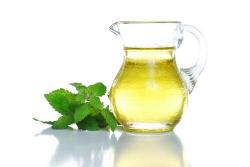 Nutritionists say the polyunsaturated fats known as omega-3 and omega-6 are essential to human health.
Nutritionists say the polyunsaturated fats known as omega-3 and omega-6 are essential to human health.
 Nutritionists say the polyunsaturated fats known as omega-3 and omega-6 are essential to human health. Yet, a new review of the most up-to-date studies suggests there is no health benefit — as many food labels claim — to vegetable oils that are rich in omega-6 fatty acid while being relatively poor in omega-3 fatty acid. In fact, such unbalanced vegetable oils, including corn and safflower oil, may actually be detrimental to health.
Nutritionists say the polyunsaturated fats known as omega-3 and omega-6 are essential to human health. Yet, a new review of the most up-to-date studies suggests there is no health benefit — as many food labels claim — to vegetable oils that are rich in omega-6 fatty acid while being relatively poor in omega-3 fatty acid. In fact, such unbalanced vegetable oils, including corn and safflower oil, may actually be detrimental to health.
In their analysis, which appears today in the Canadian Medical Association Journal, two researchers conclude certain vegetable oils should not be included in the positive health claims. “Data… generally support the replacement of saturated fats with mixed polyunsaturated fatty acids to reduce the risk of death from coronary artery disease,” the authors wrote in their analysis. “However, it is unclear whether oils rich in omega-6 linoleic acid but low in omega-3 alpha-linoleic acid also reduce this risk.”
Know Your Fatty Acids
Food can be broken down into components, which may be further broken down into chemical elements. Fat is a component of many foods, particularly meat and nuts, and it can be viewed as either saturated, monounsaturated, or polyunsaturated — these terms simply refer to the type of chemical bonds formed within the molecules. Omega-3 and omega-6 are considered polyunsaturated fats, which are essential to the health of our bodies. In fact, without polyunsaturated fats our brains would not be able to properly function. Because our bodies don’t naturally produce these polyunsaturated fats, we must eat certain foods in order to absorb them from our diet.
For instance, omega-3 fatty acids come from fatty fish, including salmon, mackerel, and tuna; they can also be found, though in lesser amounts, in walnuts and flaxseed. Omega-6 fatty acids mostly come from nuts and seeds, as well as plant oils, including corn oil, soybean oil, and sunflower oil. Omega-3 fatty acids offer many health benefits, including protection against heart disease and possibly stroke, while omega-6 fatty acids are known to lower LDL cholesterol (the “bad” cholesterol that clogs arteries) and reduce inflammation. Nutritionists often stress the fact that polyunsaturated fats are different from saturated fats, which elevate “bad” cholesterol. They are also very different from the often discussed trans fats, which are created industrially to make liquid vegetable oils more solid, and are generally considered to be very bad for your health.
Because the polyunsaturated omega-3 and omega-6 fats have long been considered good for you, the new analysis by Drs. Richard Bazinet, University of Toronto, and Michael Chu, Western University, London, Ontario, comes as a surprise to many.
What They Discovered
Upon reviewing recent work in the field of nutrion, the authors found that some vegetable oils that contain polyunsaturated fats — for instance, corn and safflower oil, which are rich in omega-6 fatty acid but contain almost no omega-3 fatty acid — may actually increase the risk of heart disease even though their labels claim they are healthy. In short, the balance of fatty acids is essential and decides whether or not a vegetable oil is actually healthy.
A study published just this past February (and quoted in the new analysis by Bazinet and Chu) explored one such unevenly balanced oil. In the study, a group of participants replaced the saturated fats in their diets with either safflower oil or safflower oil margarine — both these products are rich in omega-6 linoleic acid but low in omega-3 α-linoleic acid. As the study went along, this group of participants showed significantly lower “bad” cholesterol levels (about eight percent lower) compared to their cholesterol levels measured at the beginning of the study.
Unexpectedly, this same group of participants who used oils rich in omega-6 but low in omega-3 showed a significant increase in deaths from cardiovascular disease and coronary artery disease. Replacing saturated animal fats with an omega-6 polyunsaturated fatty acid, then, may lower serum cholesterol levels but it also increases the risk of death from coronary artery disease, the authors note.
The authors believe their findings have implications for Health Canada’s Food Directorate, which in 2009 began to allow positive health claims on food labels in which saturated fats had been replaced with polyunsaturated fatty acids. At that time, it was simply assumed that a significant reduction in LDL cholesterol also meant a reduction in the risk for coronary artery disease.
“Health Canada’s Food Directorate should reconsider the health claim that omega-6 polyunsaturated fatty acids reduce the risk of heart disease by lowering blood cholesterol levels,” wrote the authors. Simply put, not all vegetable oils are created equal.
Source: Bazinet RP, Chu MWA. Omega-6 polyunsaturated fatty acids: Is a broad cholesterol-lowering health claim appropriate? Canadian Medical Association Journal. 2013.








